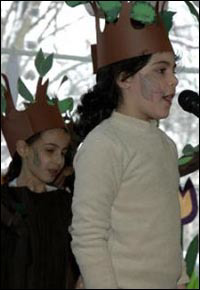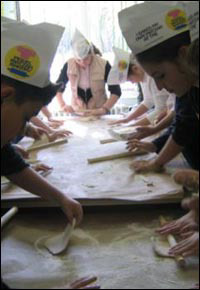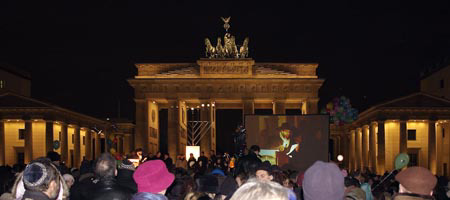Despite initial community opposition 11 years ago, Chabad-Lubavitch in Berlin has catapulted itself from a living room-based synagogue into a massive, state-of-the-art center catering to all of the German capital's Jews. Come September, for instance, Brooklyn-born Rabbi Yehuda Tiechtel and his wife Leah will officially dedicate the organization's new Rohr Chabad Center.
The location, sponsored in part by the Rohr Family Foundation, has been operating since last Rosh Hashanah; it boasts a spa-like mikvah, restaurant, offices, classrooms, library and club facilities in addition to a synagogue. It’s an example of the fundraising prowess and broad-based support the Tiechtels enjoy in a city that at first wasn’t exactly thrilled to see them coming.
Back then, leaders of Berlin's 12,000-strong Jewish community greeted the new arrivals with suspicion, fearing that part of their state subsidies would eventually be redirected to initiatives run by an outsider. In time, however, they saw that the Chabad House was self-sufficient, drawing its budget from independent fundraising.
The shift in perception was evident in a comment made by Albert Meyer, former head of the Berlin Jewish Community, that competition was "the spice of life that gets things to work at their best." Chabad had found niches, he intimated, that the state-supported infrastructure was unable to fill.
Indeed, today, said Tiechtel, community opposition is limited to a small minority. Many of the Jews reached by Chabad, he said, aren't attracted to the official community. Whether its Berlin's Jewish children, singles or young couples, the traditionally underserved segments of Jewish life all find a home at the Chabad House.
"Chabad is not competing against the existing Jewish structures," stated the rabbi. "We are providing alternatives that had never been made available to people seeking to intensify their relationship to their Jewish roots. What makes our work challenging is that we have to make people aware of their Jewish roots in the first place."
One example of the center's tapping into a sector underserved by Berlin's official Jewish apparatus was in the school system. Schools and their administrators, explained Tiechtel, had consistently left issues confronting the needs of religious children unaddressed, whether it was on questions of kosher food or participation in events deemed immodest.
"It's not that the schools did nothing," said Tiechtel. "They simply did not know how to deal with and react to situations in which religious children had to decline to participate in activities that might pose religious problems."
The Chabad-Lubavitch school, on the other hand, "has teachers that are qualified in giving not only a religious education, but also moral support based on values of religious people," he added.
Everyone Welcome

Donnell Reed, an American-born resident of Berlin, said that he and his wife Chaya have grown in their Jewish observance at Chabad. He credited that to the Tiechtels developing new programs at the outset, sometimes without guaranteed funding at the beginning.
"The Tiechtels would take whatever resources they had at their disposal, roll up their own shirt sleeves and just get the jobs done," said Reed. "If that is not inspiring, then I do not know what is."
All told, Chabad in Berlin boasts an extensive array of programs, from a Jewish family club for young professionals that explores a different topic on ethics and Judaism at each meeting, to student weekends for hundreds of college students. According to the rabbi, 500 people walk through the center each week and more than 100 turn out for Shabbat services. The new building, designed by architect Serge Tchoban, was even nominated for the German Architectural Award.
Still, some opposition remains, although not as overtly as before. Gideon Joffe, the current head of the Jewish community, now participates alongside Tiechtel in some programs. At the same time, he does not hide the fact that he hopes Chabad's activities will eventually fall administratively into the organized community structure.
Stephan Kramer, secretary general of the Central Council of Jews in Germany, worried that Chabad's activities have not always maintained unity within the existing community. He too, though, has been a frequent participant at Chabad events. In an interview, he saw in the Tiechtels' success a lesson for the community at large.

To be sure, cooperation is more the rule, rather than the exception, today. Over the past year-and-a-half, Tiechtel has increasingly involved Jewish communal leaders in structuring activities, whether it be holiday celebrations or educational programs. The community's rank and file, once extremely skeptical of Tiechtel's intentions, are beginning to feel more at ease with Chabad's presence, especially its youth programs.
Together, Chabad-Lubavitch and the Berlin Jewish Community have been increasingly more successful at moving Jewish life away from a discrete, quasi-hidden existence in a city that once was the seat of Nazi power. City administrators even granted approval for a 5-meter high Chanukah menorah to be set up in front of the city's Brandenburg Gate. Tiechtel said that such a gesture was simply a matter of common sense.
"Imagine Berlin, of all places – considering the history that had emanated from here – with no menorah, anywhere to be seen," said Tiechtel. "But, despite the odds, the Jewish community prevailed."








Start a Discussion